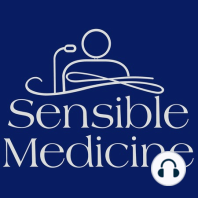57 min listen

Friday Reflection 29: The Totally Predictable Doctor as Patient Essay
Friday Reflection 29: The Totally Predictable Doctor as Patient Essay
ratings:
Length:
9 minutes
Released:
Sep 8, 2023
Format:
Podcast episode
Description
AC is a 56-year-old man brought to the emergency room by ambulance for a trauma evaluation after a bicycle crash.Sensible Medicine is a reader-supported publication. If you appreciate our work, consider becoming a free or paid subscriber.I’ve tried to stay away from the reflections that end up being part of the “doctor-as-patient” genre.[i] Books, TV shows, and movies are filled with these stories.[ii] A doctor gets sick or injured, spends time as a patient, and then authors a piece with a predictable message:• The experience made me more empathic and a better doctor.• I learned something about life.• I discovered new insights about healthcare while I was in the bed rather than next to it.• What I learned while I was a patient will help you when you inevitably become one.But I write one of these reflections every other week and I need to satisfy my brother-in-law who texted the day after I got home from the hospital, “Well, it should give you plenty of future Sensible Medicine content…”First, because it’s kind of a good one, the story of the crash itself.On the Sunday of Memorial Day Weekend my wife, daughter, and I went for a bike ride on the Chicago Lakefront path. We biked from Hyde Park on the Southside to Andersonville on the north. Our destination was a great coffee shop for coffee and Mexican chocolate cookies. After a good rest, we headed south with the wind definitively at our back. With about five miles to go, we decided we would sprint the rest of the way. My daughter got out ahead of me and, as we approached the end of our ride, I remember thinking, “these damn kids, you teach them to ride a bicycle, and then they turn 18 and you can’t keep up with them.” I’m going as fast as I can on my one speed, with about 200 feet left to go. As I ride through a congested area,[iii] another rider cuts across the path. I don’t think I hit him but my breaking and swerving sent me airborne. I opened my eyes lying in the grass, staring up at the sky, four strangers looking down at me. I did my own primary survey, recognizing that my left clavicle was broken, my spleen was fine, a few ribs were broken, but, thankfully, my head and neck seemed OK. The 24 hours in the hospital were blessedly uneventful. I learned that I had broken my clavicle, six ribs, and my scapula. I had an occult pneumothorax (not previously part of my lexicon) and subcutaneous emphysema. I was discharged after 24 hours on the trauma cocktail of acetaminophen, lidocaine patches, gabapentin, and (as needed) oxycodone.Although you should never take credit for your own health, I have a hard time not taking credit for my health. Given the eight fractures, I was in remarkably little pain. The clavicle was painful, debilitating, and unstable, but if I remained in a sling, I was OK. The reason for this: luck. I frequently remark on how people take a lot of the credit for their good health – credit they don’t deserve. Just as often, people are blamed for their poor health – blame that they rarely deserve. But with people telling me that I was doing well because I exercise regularly, that my rib fractures caused only mild pain because of my core strength, or because Capricorns have a high pain tolerance, I was prone to believe that it reflected well on me that I was not suffering more.I’m not that important.As a primary care physician, I sometimes think my patients would be lost without me. They call me daily to ask about symptoms. They message me on MyChart to ask about the results of tests ordered by other physicians. I get asked to help with issues that can’t remotely be considered medical in nature. What would happen to these people if I were just to disappear for two or three weeks? The answer: nothing. Everybody did just fine. I came back to a smattering of messages that went something like this:Nurse: “Your doctor will be out for a couple of weeks. Do you want me to forward your message to the doctor covering or
Released:
Sep 8, 2023
Format:
Podcast episode
Titles in the series (59)
Chat GPT - Medical Journals - Treating early disease states by Sensible Medicine